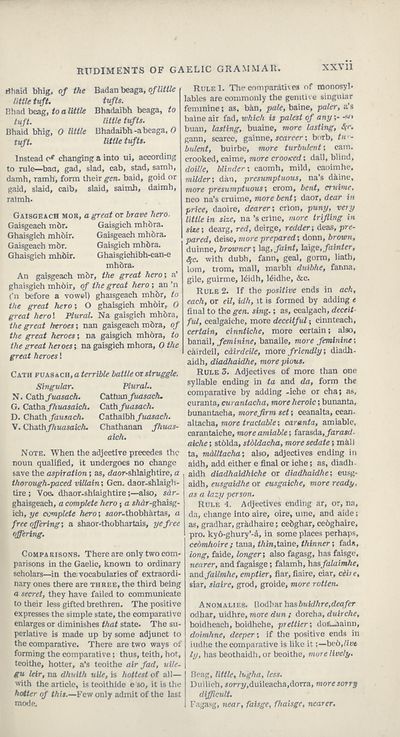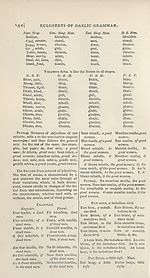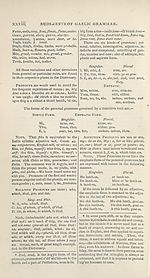Books and other items printed in Gaelic from 1871 to 1900 > Pronouncing Gaelic dictionary
(31) Page xxvii
Download files
Complete book:
Individual page:
Thumbnail gallery: Grid view | List view

XXV11
RUDIMENTS OF GAELIC GRAMMAR.
rthaid bhig, of the
little tuft.
Bhad beag, to a little
tuft.
Bhaid bhig, 0 little
tuft.
Badan beaga, of little
tufts.
Bhadaibh beaga, to
little tufts.
Bhadaibh-abeaga, 0
little tufts.
into ui, according
cab, stad, samh,
baid, goid or
daimh,
Instead changing a
to rule—baa, gad, slad,
damh, ramh, form their gen.
gaid, slaid, caib, slaid, saimh,
ralmh.
Gaisgeach mor, a great or brave hero.
Gaisgeach mbr. Gaisgich mhbra.
Ghaisgich mhbir. Gaisgeach mhbra.
Gaisgeach mbr. Gaisgich mhbra.
Ghaisgich mhbir. Ghaisgichibh-ean-e
mhbra.
An gaisgeach mbr, the great hero; a’
ghaisgich mhbir, of the great hero ; an ’n
(’n before a vowel) ghaisgeach mhbr, to
the great hero\ O ghaisgich mhbir, 0
great hero\ Plural. Na gaisgich mhbra,
the great heroes; nan gaisgeach mbra, of
the great heroes; na gaisgich mhbra, to
the great heroes\ na gaisgich mhora, 0 the
great heroes!
C ath FUASacn, a terrible battle or struggle.
Singular.
N. CdXhfuasach.
G. CdXha. fhuasaich.
D. Chath fausach.
V. ChaXhfhuasaich.
Plural..
Cathan fuasacfu
CaXh fuasach.
Cathaibh/M^wac//.
Chathanan fhuas-
aich.
Note. When the adjective precedes the
noun qualified, it undergoes no change
save the aspiration; as, ctaor-shlaightire, a
thorough-paced villain; Gen. daor-shlaigh-
tire ; Voc. dhaor-shiaightire;—also, sdr-
ghaisgeach, a complete hero; a jfair-ghaisg-
ich, ye ccmplete hero; jaor-thobhartas, a
free offering \ a shaor-thobhartais, ye free
offering.
Comparisons. There are only two com¬
parisons in the Gaelic, known to ordinary
scholars—in the. vocabularies of extraordi¬
nary ones there are three, the third being
a secret, they have failed to communicate
to their less gifted brethren. The positive
expresses the simple state, the comparative
enlarges or diminishes that state. The su¬
perlative is made up by some adjunct to
the comparative. There are two ways of
forming the comparative; thus, teith, hot,
teoithe, hotter, a’s teoithe air fad, uile-
gu leir, na dhuith uile, is hottest of all—
with the article, is teoithide e so, it is the
hotter of this.—Few only admit of the last
mode.
Rule 1. The comparatives of monosyl¬
lables are commonly the genitive singular
feminine; as, ban, pale, baine, paler, a's
baine air fad, which is palest of any-«»
buan, lasting, buaine, more lasting, &;r.
gann, scarce, gainne, scarcer; bf*rb, tw -
bulent, buirbe, more turbulent; cam.
crooked, caime, more crootccd; dall, blind,
doille, blinder \ caomh, mild, caoimhe,
milder\ dan, presumptuous, na’s daine,
more presumptuous', crom, bent, cruime,
neo na’s cruime, more bent \ daor, dear in
price, daoire, dearer', crlon, puny, very
little in size, na’s crine, more trifling in
size; dearg, red, deirge, redder-, deas, pre¬
pared, deise, more prepared', donn, brown,
duinne, browner', lag,/ainf, laige,/amfrr,
$c. with dubh, fann, geal, gorm, liath,
lorn, trom, mall, marbh duibhe, fanna,
gile, guirme, Ibidh, 16idhe, &c.
Rule 2. If the positive ends in ach,
each, or eil, idh, it is formed by adding e
final to the gen. sing.; as, cealgach, deceit¬
ful, cealgaiche, more deceitful; cinnteach,
certain, cinntiche, more certain; also,
banail, feminine, banaile, more feminine;
cairdeil, edirdeile, more friendly, diadh-
aidh, diadhaidhe, more pious.
Rule 3. Adjectives of more than one
syllable ending in ta and da, form the
comparative by adding -iche or cha; as,
curanta, curantacha, more heroic; bunanta,
bunantacha, more firm set', eeanalta, cean-
altacha, more tractable; caranta, amiable,
carantaiche, more amiable; fa rasda ,/a ra -
aiche; stblda, stbldacha, more sedate; m&ll
ta, mdlltacha; also, adjectives ending in
aidh, add either e final or iche; as, diadh
aidh diadhaidhiche or diadhaidhe; eusg-
aidh, eusgaidhe or eusgaiche, more ready,
as a lazy person.
Rule A. Adjectives ending ar, or, na,
da, change into aire, oire, ume, and aide;
as, gradhar, gradhaire; cebghar, cebghaire,
pro. kyb-ghury’-a, in some places perhaps,
cebmhoire ; tana, in,taine, thinner; fada,
long, faide, longer', also fagasg, has faisge,
nearer, and fagaisge; falamh, has falaimhe,
and failmhe, emptier, fiar, fiaire, ciar, cdhe,
siar, siaire, grod, groide, more rotten.
Anomalies. Bodharhasbuidhre,deafer
odhar, uidhre, more dun; dorcha, duirche,
boidheach, boidhche, prettier; dofi—lainn,
doimhne, deeper; if the positive ends in
iudhe the comparative is like itbeb,/iye
ly, has beothaidh, or beoithe, more lively.
Beag, little, lugha, less.
Duilich, sorry,duileacha,dorra, more sorry
difficult.
I Fagasg, near, faisge, fhaisgc, nearer.
RUDIMENTS OF GAELIC GRAMMAR.
rthaid bhig, of the
little tuft.
Bhad beag, to a little
tuft.
Bhaid bhig, 0 little
tuft.
Badan beaga, of little
tufts.
Bhadaibh beaga, to
little tufts.
Bhadaibh-abeaga, 0
little tufts.
into ui, according
cab, stad, samh,
baid, goid or
daimh,
Instead changing a
to rule—baa, gad, slad,
damh, ramh, form their gen.
gaid, slaid, caib, slaid, saimh,
ralmh.
Gaisgeach mor, a great or brave hero.
Gaisgeach mbr. Gaisgich mhbra.
Ghaisgich mhbir. Gaisgeach mhbra.
Gaisgeach mbr. Gaisgich mhbra.
Ghaisgich mhbir. Ghaisgichibh-ean-e
mhbra.
An gaisgeach mbr, the great hero; a’
ghaisgich mhbir, of the great hero ; an ’n
(’n before a vowel) ghaisgeach mhbr, to
the great hero\ O ghaisgich mhbir, 0
great hero\ Plural. Na gaisgich mhbra,
the great heroes; nan gaisgeach mbra, of
the great heroes; na gaisgich mhbra, to
the great heroes\ na gaisgich mhora, 0 the
great heroes!
C ath FUASacn, a terrible battle or struggle.
Singular.
N. CdXhfuasach.
G. CdXha. fhuasaich.
D. Chath fausach.
V. ChaXhfhuasaich.
Plural..
Cathan fuasacfu
CaXh fuasach.
Cathaibh/M^wac//.
Chathanan fhuas-
aich.
Note. When the adjective precedes the
noun qualified, it undergoes no change
save the aspiration; as, ctaor-shlaightire, a
thorough-paced villain; Gen. daor-shlaigh-
tire ; Voc. dhaor-shiaightire;—also, sdr-
ghaisgeach, a complete hero; a jfair-ghaisg-
ich, ye ccmplete hero; jaor-thobhartas, a
free offering \ a shaor-thobhartais, ye free
offering.
Comparisons. There are only two com¬
parisons in the Gaelic, known to ordinary
scholars—in the. vocabularies of extraordi¬
nary ones there are three, the third being
a secret, they have failed to communicate
to their less gifted brethren. The positive
expresses the simple state, the comparative
enlarges or diminishes that state. The su¬
perlative is made up by some adjunct to
the comparative. There are two ways of
forming the comparative; thus, teith, hot,
teoithe, hotter, a’s teoithe air fad, uile-
gu leir, na dhuith uile, is hottest of all—
with the article, is teoithide e so, it is the
hotter of this.—Few only admit of the last
mode.
Rule 1. The comparatives of monosyl¬
lables are commonly the genitive singular
feminine; as, ban, pale, baine, paler, a's
baine air fad, which is palest of any-«»
buan, lasting, buaine, more lasting, &;r.
gann, scarce, gainne, scarcer; bf*rb, tw -
bulent, buirbe, more turbulent; cam.
crooked, caime, more crootccd; dall, blind,
doille, blinder \ caomh, mild, caoimhe,
milder\ dan, presumptuous, na’s daine,
more presumptuous', crom, bent, cruime,
neo na’s cruime, more bent \ daor, dear in
price, daoire, dearer', crlon, puny, very
little in size, na’s crine, more trifling in
size; dearg, red, deirge, redder-, deas, pre¬
pared, deise, more prepared', donn, brown,
duinne, browner', lag,/ainf, laige,/amfrr,
$c. with dubh, fann, geal, gorm, liath,
lorn, trom, mall, marbh duibhe, fanna,
gile, guirme, Ibidh, 16idhe, &c.
Rule 2. If the positive ends in ach,
each, or eil, idh, it is formed by adding e
final to the gen. sing.; as, cealgach, deceit¬
ful, cealgaiche, more deceitful; cinnteach,
certain, cinntiche, more certain; also,
banail, feminine, banaile, more feminine;
cairdeil, edirdeile, more friendly, diadh-
aidh, diadhaidhe, more pious.
Rule 3. Adjectives of more than one
syllable ending in ta and da, form the
comparative by adding -iche or cha; as,
curanta, curantacha, more heroic; bunanta,
bunantacha, more firm set', eeanalta, cean-
altacha, more tractable; caranta, amiable,
carantaiche, more amiable; fa rasda ,/a ra -
aiche; stblda, stbldacha, more sedate; m&ll
ta, mdlltacha; also, adjectives ending in
aidh, add either e final or iche; as, diadh
aidh diadhaidhiche or diadhaidhe; eusg-
aidh, eusgaidhe or eusgaiche, more ready,
as a lazy person.
Rule A. Adjectives ending ar, or, na,
da, change into aire, oire, ume, and aide;
as, gradhar, gradhaire; cebghar, cebghaire,
pro. kyb-ghury’-a, in some places perhaps,
cebmhoire ; tana, in,taine, thinner; fada,
long, faide, longer', also fagasg, has faisge,
nearer, and fagaisge; falamh, has falaimhe,
and failmhe, emptier, fiar, fiaire, ciar, cdhe,
siar, siaire, grod, groide, more rotten.
Anomalies. Bodharhasbuidhre,deafer
odhar, uidhre, more dun; dorcha, duirche,
boidheach, boidhche, prettier; dofi—lainn,
doimhne, deeper; if the positive ends in
iudhe the comparative is like itbeb,/iye
ly, has beothaidh, or beoithe, more lively.
Beag, little, lugha, less.
Duilich, sorry,duileacha,dorra, more sorry
difficult.
I Fagasg, near, faisge, fhaisgc, nearer.
Set display mode to:
![]() Universal Viewer |
Universal Viewer | ![]() Mirador |
Large image | Transcription
Mirador |
Large image | Transcription
Images and transcriptions on this page, including medium image downloads, may be used under the Creative Commons Attribution 4.0 International Licence unless otherwise stated. ![]()
| Rare items in Gaelic > Books and other items printed in Gaelic from 1871 to 1900 > Pronouncing Gaelic dictionary > (31) Page xxvii |
|---|
| Permanent URL | https://digital.nls.uk/106759839 |
|---|
| Description | Out-of-copyright books printed in Gaelic between 1631 and 1900. Also some pamphlets and chapbooks. Includes poetry and songs, religious books such as catechisms and hymns, and different editions of the Bible and the Psalms. Also includes the second book ever published in Gaelic in 1631. |
|---|

